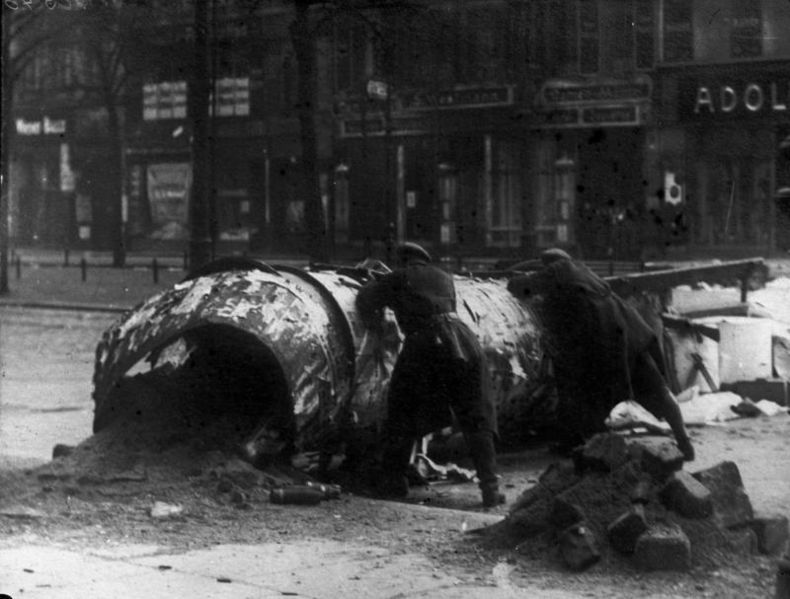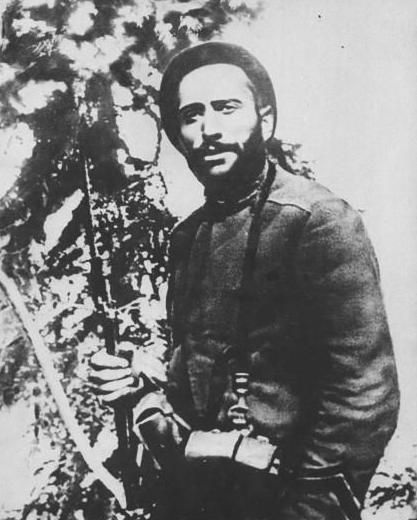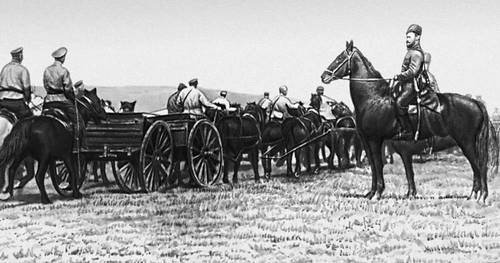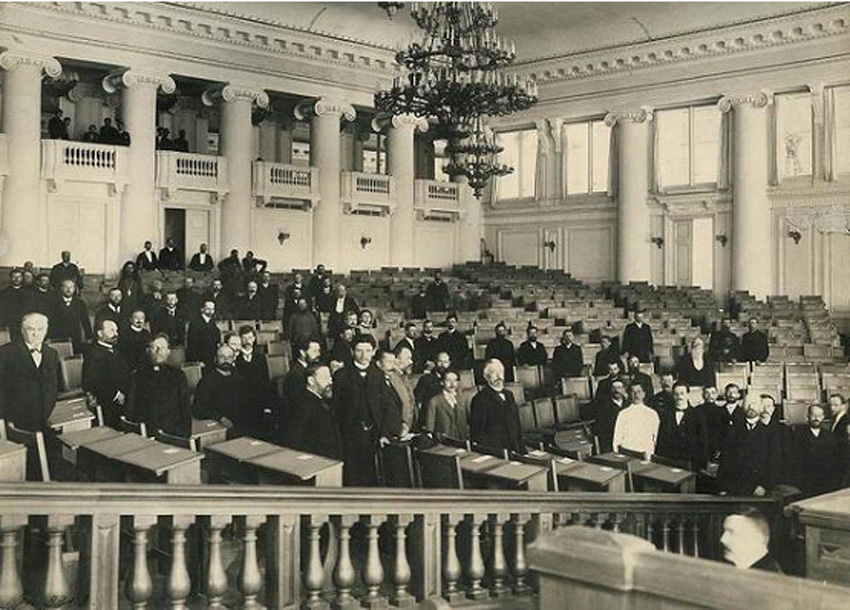The Darkest hour of the Russian Empire 2
- Thread starter unmerged(358653)
- Start date
-
We have updated our Community Code of Conduct. Please read through the new rules for the forum that are an integral part of Paradox Interactive’s User Agreement.
You are using an out of date browser. It may not display this or other websites correctly.
You should upgrade or use an alternative browser.
You should upgrade or use an alternative browser.
I so hate Goremykin!!! The old-ashed-anachronysm! And he have an alzheimer, how he can work anyway?? We gonna prepare some bombs with comrades, and train some bombermen from us, just to clean Russia from his criminal and disgusting presence.
:ninja:
Great AAR! , буду читать
:ninja:
Great AAR! , буду читать
Wow, so many comments. Many thanks, guys 
@Old Joe: Goremykin is a very old man, he'll probably leave his post soon, so don't worry
@Razgriz 2K9: When you're able to break history - break it! For what else do we have Paradox strategies?
@Milites: Nice song, I like it.
In next update (it will be posted tomorrow) I'll speak more about economy, industry, political parties and other stuff about post-war Russia. Your comments are really appreciated by me
@Old Joe: Goremykin is a very old man, he'll probably leave his post soon, so don't worry
@Razgriz 2K9: When you're able to break history - break it! For what else do we have Paradox strategies?
@Milites: Nice song, I like it.
In next update (it will be posted tomorrow) I'll speak more about economy, industry, political parties and other stuff about post-war Russia. Your comments are really appreciated by me
The Darkest hour of the Russian Empire 2

Chapter Zero: Introduction
Part II: Political life of the Empire
Part II: Political life of the Empire
New political regime was a shock for the Russian citizens, and, actually, for the whole Europe. Political intrigues became a part of everyday life. Russian Empire had 8 political parties in the Parliament. All these factions had its own policies and targets. Together with the Emperor members of the Parliament had to do the great work to resurrect Russia after the Great War.
Ideology: Social-Conservative
Political views: Limited democracy, state capitalism, strong foreign policy
Supported by: Most of the population, mainly by the army
Leader: Ivan Goremykin (current prime minister) / Alexander Guchkov (chairman)
Targets: To continue official course of the Empire without any changes
Official name of this party is "Union of the 7th of October" - named after the day of first Russian constitutional manifesto (in 1905). This party is strongly centrist, in Russian press they often called "liberal monarchists" - and that's right, Octobrists don't want to change anything at the moment - elected Parliament and Prime minister together with enough powerful Emperor is the best variant of regime for them. This party was founded in 1905 by Guchkov, and during the Great War it was ruling. At the moment Octobrists are the strongest faction of the Duma (together with Conservative Monarchist they have about 60% of seats).
Ideology: Market Liberal
Political views: Full democracy, freedom of press, more power to Parliament, laissez-fair capitalism
Supported by: University officials, students, liberals, some capitalists
Leader: Pavel Milyukov
Targets: To make the Russian Empire more liberal with continuation of "50-50" policy
Kadets (KD or Constitutional Democrats) are considered to be the strongest opposition party, and the last elections proved that - Milyukov's party got 116 seats in Duma (2nd result). They popularity is obvious - Kadets, officially founded in 1905, always had a strong support of liberal-thinking society and "westerners" (so-called "zapadniki"). Nowadays Constitutional Democrats want to make the economy completely free, get rid of press censorship and official state religion, make the Parliament more powerful and so one - classical liberal list. But Kadets are not so simple - they agree with Octobrists in two points - militarism and imperial foreign policy. Constitutional Democrats are not pacifists like their "colleagues" from Liberal-Democratic party, and they aren't so focused on social needs, so they are often criticized to be "capitalist party".
Ideology: Paternal Autocrats
Political views: Limited autocracy, state capitalism, state religion, focus on internal security
Supported by: Conservatives, army, peasants, clergy
Leader: Andrey Vyazigin
Targets: To give more power to the Tsar, restore the economy with direct control of capitalists, support Russian Army and Orthodox Church
KM, or Conservative Monarchists, is a right-oriented monarchist party, which is now in a coalition with the Octobrists. By the way, leader of the party, Vyazigin (professor of the St. Petersburg Imperial University) doesn't like Octobrists and their policy. He says that Octobrists are not cold and not hot - they try to mix democracy with tsarism, which is impossible in his opinion. So, the coalition with them is not a warm and peaceful one. KM party thinks that Parliamentary system of 1905-1914 (state-controlled elections, not-elected Prime ministers, not-elected Senate) was better than the current one, but they agree with the Constitution and don't want to return autocratic times. Also, they are supported by the Orthodox Church and have strong position amongst the army authorities. So, they are traditional monarchists and don't have any radical political views (like chauvinistic SRN, for example).
Ideology: Social Liberal
Political views: Human rights, social policy, freedom of press and religion, free society
Supported by: Ultra-liberals, nationalist factions (Galizia, Finland, Poland)
Leader: Nikolay Timashev
Targets: A lot more power to the Parliament, make the ministers appointed by the Parliament, freedom as an absolute value, free economy, social guarantees and free trade-unions
This party is probably the most radical from the liberal right parties. Their target is a "crowned republic" like UK and Sweden, when the monarch doesn't have any real power. While their political program is similar to KD's, their social and economical policy is completely different. Liberal-Democratic Party is against the current political situation, its leader, young and ambitious Timashev, diagrees with "50-50", he wants "80-20" policy for the Parliament. He wants to make all key people of the state elected - governors, ministers, senators and so on. This party is supported also by regional national movements in some non-Russian provinces like Tsardom of Poland or Grand Duchy of Finland, because of the party's points is autonomy to all Imperial States. At the moment this party is in the shadow of stronger KD, but they have a great potential for the next elections.
Social-Democratic Party
Ideology: Social Democratic
Political views: Human rights, freedom of trade, more rights to workers, more state control of economy
Supported by: Well-paid workers, farmers, craftsmen
Leader: Alexander Kerensky
Targets: More social rights and guarantees, state-defended trade unions, labor laws
Kerensky's party is for "crowned republic" too, and targets of SD are really similar to the targets of LDP, but Social Democrats are left. That means that their main electorate is workers and craftsmen (but only well-paid, because SD don't agitate for nationalization and "class equality"). Earlier that party was known as "Trudoviks" ("Labor party"). Nowadays it's the strongest left-wing faction in the Parliament, but SD has only 3.6% of seats, so their votes don't have any real power. Has bad relations to both liberals (KD, LDP) and socialists (SR, MN). So, this party stands alone for now.
Union of the Russian people
Ideology: Fascism
Political views: Dominant Russian nation, Tsarism autocracy, Orthodox state, Anti-Jew laws
Supported by: Reactionary aristocrats and army officials
Leader: Vladimir Purishkevich
Targets: All power to the Tsar, ban all left and liberal parties (MN, SR, SD, LDP), create Anti-Jew law codex, make Orthodox church the state religion
The most notorious party of Russia - a fascist faction called "Union of the Russian people". Members of this party, led by extremely charismatic anti-Semitic politician Purishkevich, believe that Autrocratic Russia is the only path to glory of the nation. These marginals are not officially supported by the Imperial Government and ruling Octobrist parties, because their ideas are too radical - SRN wants to bring back the times of anti-Semitic pogroms, total press censorship and banned leftist parties. This faction has some popularity mainly because of Purishkevich's talent - leader of SRN is a brilliant speaker. Union of the Russian people has contacts with similar foreign parties - for example, with Italian fascists or German Freikor groups.
Socialist-Revolutionary Party

Viktor Chernov

Viktor Chernov
Ideology: Left-Wing Radical
Political views: Radical socialism, all power to the Parliament, half-nationalization of economy, state-protected trade unions and workers coalitions
Supported by: Low-paid workers, students
Leader: Viktor Chernov
Targets: To make Russia more socialistic, to nationalize the main industrial centers, to make the Emperor's power formal.
SRs has a long history, beginning in the XIX century. Many years Socialist-Revolutionary party was banned, and made a lot of terrible terroristic acts to fight for their rights. But in 1905 after the Imperial Manifesto this party became legal, and its leader Viktor Chernov returned to Russia. During the Great War SRs were for war and victory, not like anti-war Bolsheviks, and that fact made them quite popular amongst workers and soldiers of the Imperial Army. Today, its main task is to take as many seats in the Duma as possible, because the elections gave them only 13 of them. Chernov's plans include something like "socialist empire", of course with just formal Tsar as the Head of State.
Mensheviks

Irakli Tsereteli

Irakli Tsereteli
Ideology: Socialist
Political views: Socialism, state central-planned economy, rights of all nations, workers and peasants rights, full nationalization
Supported by: Low-paid workers, peasants
Leader: Irakli Tsereteli
Targets: Full nationalization and ban of right parties like SRN and KM, more basis on agriculture and peasants, support of the autonomization of non-Russian regions
Mensheviks are a leftist socialist party, which originally comes from RSDRP party. "Mensheviks" means "minority" (because they protected interests of peasants in RSDRP), while their opponents "Bolsheviks" meant "majority" (their interests were based on the workers). Nowadays, Bolsheviks don't have any support and officially banned, while the Mensheviks with their theory of "peasant socialism" have 5 seats in the State Duma. They focus on socialism, nationalization of the industry and agriculture - but actually they don't have any support from the peasants themselves - peasants usually vote for SO, CM, SRN and SD. Anyway, their current leader, Georgian-born Irakli Tsereteli, is an ambitious and charismatic person, and he has some plans about party program - for example, he wants to become an autonomist left party to gain support from Poland, Georgia or Finland (like LDP). At the moment they have no power in the Duma having less than 1%.
To be continued
Waiting for your comments
Next update: December, 18
Waiting for your comments
Next update: December, 18
Last edited:
hmh 3 hours early 
hahah i think i know who owuld play chernov if hw would make a movie about this
hahah i think i know who owuld play chernov if hw would make a movie about this
Hm... I like the Kadets and the Octobrists the best so far, assuming democracy stays in Russia. If not, then the Conservative Monarchists have my support. Just no left parties or any Fascism, and all is well.
Union of the Russian People for the win! Also, that is definitely where Ungern-Sternberg and Wrangel are going.
This is all filthy tzarist propaganda telling that communism didn't got any ground in Russia! But the truth is all workers and peasants are just waiting for the right moment to overthrow that rotten system! And no populist measures like this puppet-clowns Duma won't help them!!!11 Agrr! At least comrades at Germany probably taking their chances after one of those half-absolutists political-catastrophe!
But the truth is all workers and peasants are just waiting for the right moment to overthrow that rotten system! And no populist measures like this puppet-clowns Duma won't help them!!!11 Agrr! At least comrades at Germany probably taking their chances after one of those half-absolutists political-catastrophe!

The Darkest hour of the Russian Empire 2

Chapter One: 1920s
Part III: European Time of Troubles: 1919-1922
Part III: European Time of Troubles: 1919-1922
When Russia was electing her new political course, the history didn't stop in the other countries - Europe changed completely after four years of the world war. Colonial empires like France and Britain suffered deep economical crisis which was caused by the Great War. Things were the same in Russia, whose "industrial heart" - Poland - was badly hurt during 1914-1916, when it was the main theater of war. So, the first task for the government was to reintegrate the economy.

Russian factory, producing the artillery
The best Russian military factories were far away from the frontlines - in Moscow, Kiev and St. Petersburg, so army and naval industry was fine. But the civil goods production was nearly stopped - most of consumer goods facilities were destroyed during the war. It was vital to restart the assembly lines, because lack of everyday goods could lead to riots among the workers or peasants. Young talented economist from Liberal-Democratic Party, Nikolay Kondratiev, proposed a plan of reindustrialization of the country on the first session of the State Duma. With strong support of Octobrists, Kadets and Liberal-Democrats the plan was accepted. Its main idea was to establish strict government control after consumer good producers and to build more factories in low-infrastructure areas of Siberia and Far East to create enough workers' vacancies there.

Kondratiev, author of the Reindustrialization
Meanwhile, in Europe 1919 started with a kind of German civil war. After the total defeat neither democrats nor monarchists were popular - other guys became the idols of the streets - ultra-right and ultra-left radicals. One of such organizations, communist party called Spartaksbund (Spartacus Union) launched a great street revolt. Main cities of Germany soon became barricades. The situation in this country became unpredictable...

Spartacists riflemen in the streets of Berlin
German legitimate government soon realized, that without strong army and police (which were restricted by harsh Versailles treaty) they couldn't stop this bloody nightmare. German president Ebert had no choice - he asked leaders of strong paramilitary revanchist union called "Freikorps" (Volunteer Corps, which consisted of ultra-right activists, former soldiers, officers and generals of the Kaiser's army) to help against the communists.

Freikorps squad
The bloody fight finished only in March, when the leaders of the rebellion - Karl Liebknecht and Rosa Luxemburg were murdered. Everybody in Europe realized, that ultra-rights became extremely powerful, and not only in Germany. In Italy young former socialist Benito Mussolini founded his own unique political party with a special political doctrine - "to be left in economy and right in policy".

A founder of the word "Fascism"
On 30 of November Russia was shocked by news from the Parliament - elected prime minister Ivan Goremykin died at the age of 80. So, Russia needed a new prime minister. According to the Constitution, another man from majority party should be appointed on that post. Alexander Guchkov, leader of the Octobrists, accepted the suggestion and became a new leader of the government. He was quite young and had a lot of fresh ideas, but Guchkov was really unpopular figurehead...

Octobrist Guchkov is a new prime minister of the Empire, Conservative Monarchist Makarov takes the post of Okhranka director
Bad news from Europe continued spreading - 1920 started with new conflicts in Germany. Everything was going to become a full-scale civil war. A lot of "new wave"-politicians started to gain popularity. One of such men was a wounded corporal Adolf Hitler from 16th Bavarian regiment. His ideas, his brilliant speeches and revanchist hysteria made him more and more popular every day...

This man is becoming dangerous...
Communists didn't want to surrender - on 15 of March in 1920 they finally formed a powerful paramilitary unit of "Ruhr Red Army", which was equal to most of Freikorps forces. These people, driven by the class hate and Marxist propaganda (the Russians knew exactly what is Marxist propaganda - during the Great War, when the Empire was fighting for survival, Bolsheviks agitated soldiers to stop fighting, overthrow the Tsar and found a socialist republic...). Leaders of these parties had strong contacts with other revolutionary groups over the world. On the other hand, ultra-right political parties started uniting too - for example, Purishkevich had a secret meeting with some German revanchist politicians. 1920s were going to become as bloody as 1910s...

Emblem of the German communists
Summer Olympics of 1920 slightly helped to improve the relationships between nations of Europe - it was the first international sports competition since the Great War. Russian athletes visited the Olympics too and won 30 medals, having the 4th place. USA were the first, Sweden the second, UK the third. It was a symbolic decision to choose Antwerpen as host city - Antwerpen was a place of the bloodiest battles of the Western front. Having Olympics there was a sign of peace and restoration of Europe...

Summer Olympics in Antwerpen
On 7 of November American presidential elections started, and Republican candidate Warren Harding defeated James Cox. The USA got a conservative ruler for the new future. These elections were the first ones, where the women were allowed to vote - a nice step for a democracy.

New American president
On 4 of March of 1921 Harding was officially inaugurated as the 29th President of the United States. On 28 of June Russian ally, Kingdom of Serbs, Croats and Slovens accepted a new Constitution (called "Vidovdan Constitution"), which was an attempt to lower the tensions between different southern Slavic nations. Anyway, it was a failure - communists and Croatian parties boycotted the new Constitution.

Yugoslavia after the Vidovdan
Germany was still split into two fighting sides. Hitler was appointed as fuhrer of Nazi party. Now he was an important figurehead of German politics. Russian intelligence started watching his party...
.jpg)
Nazi poster. Nowadays this party is weak, but what are their plans?
In Russia first two years of reindustrialization program were beneficial. Millions of workers got well-paid jobs, everyday new factories were being found. The Tsar personally thanked Russian economists for their wonderful plan - Russia was in industrial boom, just like the USA - while Europe was in deep depressive crisis.

New industrial facilities of growing Russia
"A little victorious war" - Russo-Afghan War 1922-1923
Good results of industrial program made Russian government to switch their opinion to the world politics. Britain was weak after the War, and it was a nice chance for Russia to achieve some successes in the Great Game. Even after demobilization and cuts of the army Russian military forces were the biggest in the world - reindustrialization gave Russian soldiers new artillery, cars and airplanes. Now it was a fine moment to demonstrate the might. In General Staff there were two main opposing groups - followers of Brusilov, who wanted to enlarge Russian sphere of influence in the Middle East and Persian Gulf, and followers of Alexeev, whose plans were about the Far East.

Markov, Denikin and Alexeev
Finally, the Emperor chose his side and supported Brusilov. The target was selected - the Middle East. The most suitable state for short victorious invasion was Afghanistan - without German and British support this mountainous state could do nothing with the Russian army. The war declaration was planned on 12 of April...
Troops of Russian Turkestani Military District, 1st and 2nd Turkestani Corps, supported by mountain infantry and local Tajik guides, crossed the border. Afghanistan army wasn't a real threat for the Russians, so General Staff believed to finish that war very soon.

Russian army supply trains in Afghanistan
But Afghanistan was not so easy to beat. Legitimate Khan's army was defeated in a few weeks, but Afghani mountains, climate and impressive partisan movement made the entire campaign a very challenging task. Russian generals wanted to have a "parade war", but got a hard conflict and quite high losses rate. Kabul fell only on 14 of October.
After that it took 4 months to beat all existing partisan movements and after that Afghanistan was annexed. Russian Imperial Army lost 20,000 men killed and wounded during that conflict - it was unexpected, and forced Russian generals to change their strategy and modernize the army. Anyway, a great strategic success of the Great Game was achieved - Afghanistan became a Russian protectorate!
Last edited:
@Red Cesar: Do you mean Marxists in Russia? Well, soft Marxists - Mensheviks - are in the Duma. Radicals right Bolsheviks are banned and nowadays are in emigration. Why do you need them btw? 
Uh, you may want to get rid of the swastika. I'd rather not see you banned.
Anyway, excellent update! So, speaking of women being allowed to vote, what are the rules of women voting in Russia? Out of curiosity, of course?
Anyway, excellent update! So, speaking of women being allowed to vote, what are the rules of women voting in Russia? Out of curiosity, of course?
@SovietAmerika: Oh, sorry, completely forgot about swastika rules...OK, let's sacrifice some historicism  In Russia women are not allowed to vote, Russian people are too conservative for this.
In Russia women are not allowed to vote, Russian people are too conservative for this.
I want to see Alexei(and to a lesser extent, Nicholas I) get assassinated, and a miltary coup(like the 2-26 incident) soon afterward that puts Anastasia in power (just for fun)













